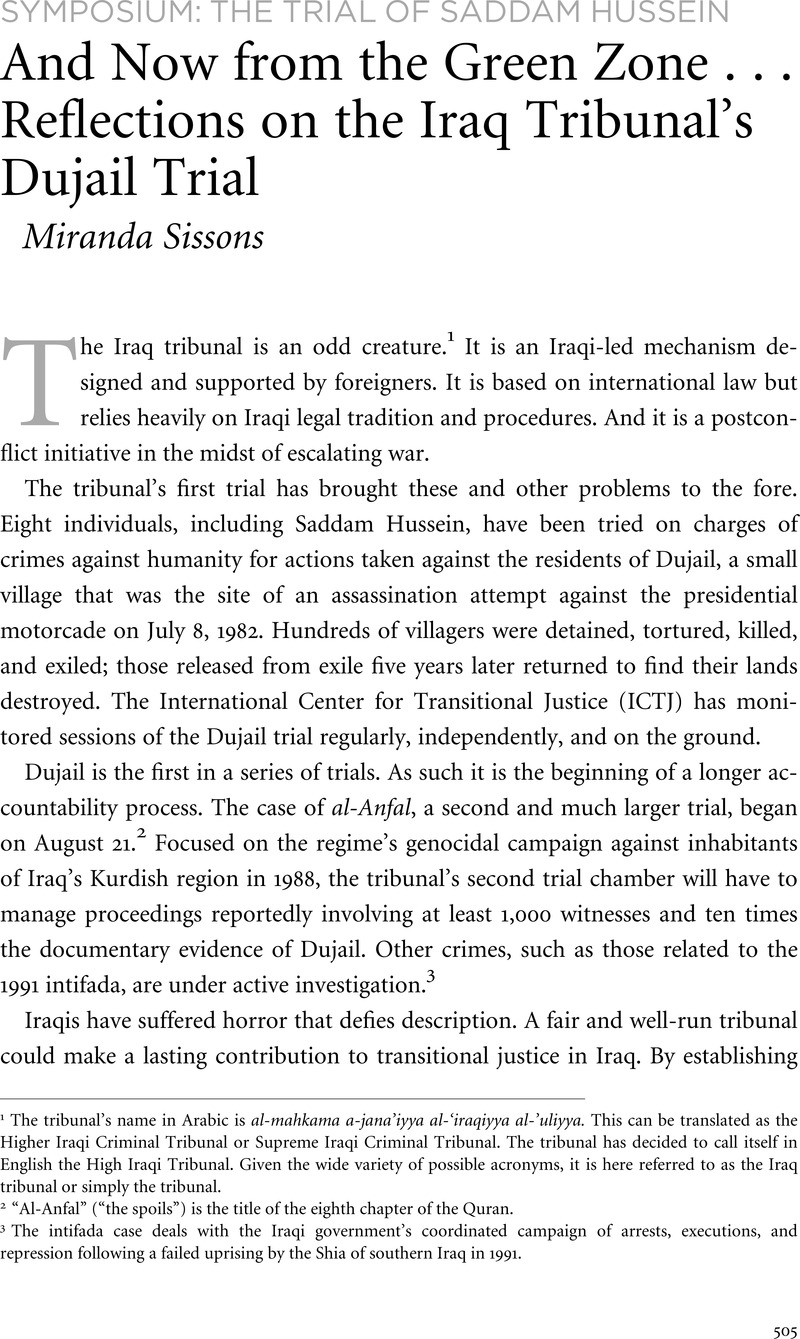Published online by Cambridge University Press: 25 March 2011

1 The tribunal's name in Arabic is al-mahkama a-jana'iyya al-‘iraqiyya al-’uliyya. This can be translated as the Higher Iraqi Criminal Tribunal or Supreme Iraqi Criminal Tribunal. The tribunal has decided to call itself in English the High Iraqi Tribunal. Given the wide variety of possible acronyms, it is here referred to as the Iraq tribunal or simply the tribunal.
2 “Al-Anfal” (“the spoils”) is the title of the eighth chapter of the Quran.
3 The intifada case deals with the Iraqi government's coordinated campaign of arrests, executions, and repression following a failed uprising by the Shia of southern Iraq in 1991.
4 Coalition Provisional Authority (CPA) Order 48, “Delegation of Authority Regarding an Iraqi Special Tribunal,” issued December 10, 2003. Iraqi criminal law did not include the offenses of genocide, war crimes, and crimes against humanity; by including them, the Iraqi Special Tribunal (IST) Statute effectively amended existing Iraqi criminal law. According to international humanitarian law (IHL), an occupying power is limited in the changes it can make to the penal laws of the country it occupies. For a discussion of the tribunal's creation, see ICTJ Briefing Paper, “Creation and First Trials of the Supreme Iraqi Criminal Tribunal,” October 2005; available at http:\\www.ictj.org/images/content/1/2/123.pdf.
5 The U.K. has played a productive role in the tribunal's development within the limits required by its opposition to the death penalty.
6 Supreme Iraqi Criminal Tribunal Law No. 10 of 2005 and Rules of Procedure and the Gathering of Evidence of the Supreme Iraqi Criminal Tribunal. Both published in al-Waqa'ia al-Iraqiyya (the official gazette of the Republic of Iraq), no. 4006, October 18, 2005. Effective on publication.
7 Assistance is also complicated by the tribunal's retention of the death penalty.
8 Law No. 10 of 2005 differed in several respects from the tribunal statute issued by the CPA. One change is Article 16, which establishes that the tribunal “shall” follow the rules of the Iraqi Code of Criminal Procedure of 1971 and its own rules of procedure. Article 14(4) is also new, and though ambiguous it appears to allow the tribunal to hear cases of crimes under the regular Iraqi penal code if the “special element” of the international crimes in the tribunal's statute is missing.
9 The practices are innovative in that they exist neither in the Iraqi legal system nor in the civil law legal systems in the Middle East. They have been important tools, however, for most judicial mechanisms trying international crimes.
10 Cassation is a process in civil-law legal systems that is roughly equivalent to appeal proceedings, although a cassation chamber generally has broader powers than an appeals chamber.
11 See Tom Perriello and Marieke Wierda, “The Special Court for Sierra Leone Under Scrutiny,” ICTJ Prosecutions Case Studies Series, March 2006.
12 This is not to say legal issues cannot also be political. But defense tactics such as repeated boycotts, claims of Iranian influence over Dujailis, and referring to defendants by their former titles have occupied more time and energy than discussion of evidence or charges. Indeed, the best lawyer in the courtroom was the defendant Barzan Ibrahim al-Hassan al-Tikriti, who could be depended on to loudly and regularly raise every point that might benefit his case.
13 Other minimum guarantees include the rights of the defendant to: be informed of charges promptly and in sufficient detail; defend himself or through legal assistance of his own choosing; examine witnesses against him; obtain and examine witnesses on his behalf under the same conditions as witnesses against him; an expeditious trial; and review of his conviction and sentence by a higher tribunal. See International Covenant on Civil and Political Rights, Article 14; available at http:\\www.unhchr.ch/html/menu3/b/a_ccpr.htm. For a detailed discussion of the right to representation, see Human Rights Watch, “The Iraqi High Tribunal and Representation of the Accused: A Human Rights Watch Briefing Paper,” February 2006, vol. 1; available at hrw.org/backgrounder/mena/iraq0206/iraq0206.pdf.
14 We cannot verify whether audiovisual materials were disclosed prior to the session in which they were aired.
15 On May 16, 2006, defense lawyer Najib al-Nuami requested written copies of the charging instruments that were read aloud on May 15. The presiding judge confirmed they were not yet available, but would be distributed as soon as they were printed. English-language versions were already available on the Grotian Moment trial blog, http:\\www.law.case.edu/saddamtrial.
16 Presiding Judge Ra'uf Abd al-Rahman to defendant Barzan Ibrahim al-Hassan al-Tikriti, tribunal session July 24, 2006, ICTJ observer notes. The comment was made while warning the defendant against using his defense statement as an opportunity to incite violence.
17 Official tribunal statements at the conclusion of the investigation phase of the Dujail trial did not list Saddam Hussein as one of the accused. See Iraqi Special Tribunal, “Investigation Into al-Dujail Crimes Concludes,” February 26, 2005; available at http:\\www.iraq-ist.org/en/press/releases/0014a.htm.
18 Gary Jonathan Bass, Stay the Hand of Vengeance: The Politics of War Crimes Tribunals (Princeton: Princeton University Press, 2000), p. 310.